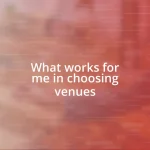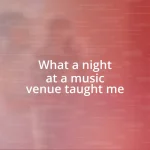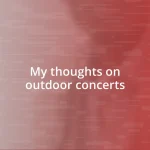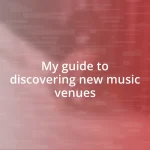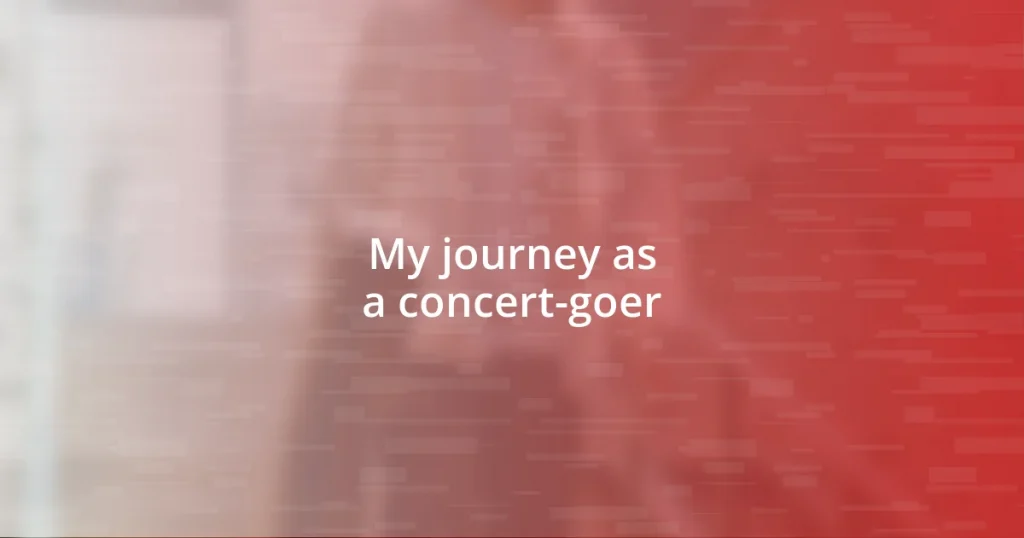Key takeaways:
- Identify the venue’s alignment with the event’s theme, considering factors like capacity, layout, and accessibility to enhance the atmosphere and guest experience.
- Thoroughly assess venue locations for public transport links, parking, and surrounding environments to avoid logistical issues and distractions during events.
- Evaluate budget considerations beyond rental fees, accounting for hidden costs and the overall value of included amenities to ensure a successful and enjoyable event.

Understanding your venue needs
Understanding your venue needs is all about reflecting on the essence of your event. I remember planning a surprise birthday party for my friend and realizing that the space needed to embody her personality—intimate yet vibrant. Have you ever thought about how the atmosphere can shape the entire experience? Finding a venue that resonates with your event’s theme is crucial.
When determining your venue requirements, consider the specifics like capacity, layout, and technical needs. I once underestimated the importance of sound systems during a corporate meeting, leading to a frustrating day for everyone. Have you assessed whether your venue can accommodate your audio-visual needs? Those little things can become monumental, affecting engagement and flow.
Don’t overlook the location. I once chose a beautiful venue that was perfect on the inside, but the inconvenient location made it hard for guests to arrive on time. Is accessibility a factor in your selection? It’s essential to ensure your venue is not only aesthetically pleasing but also practical for your guests.
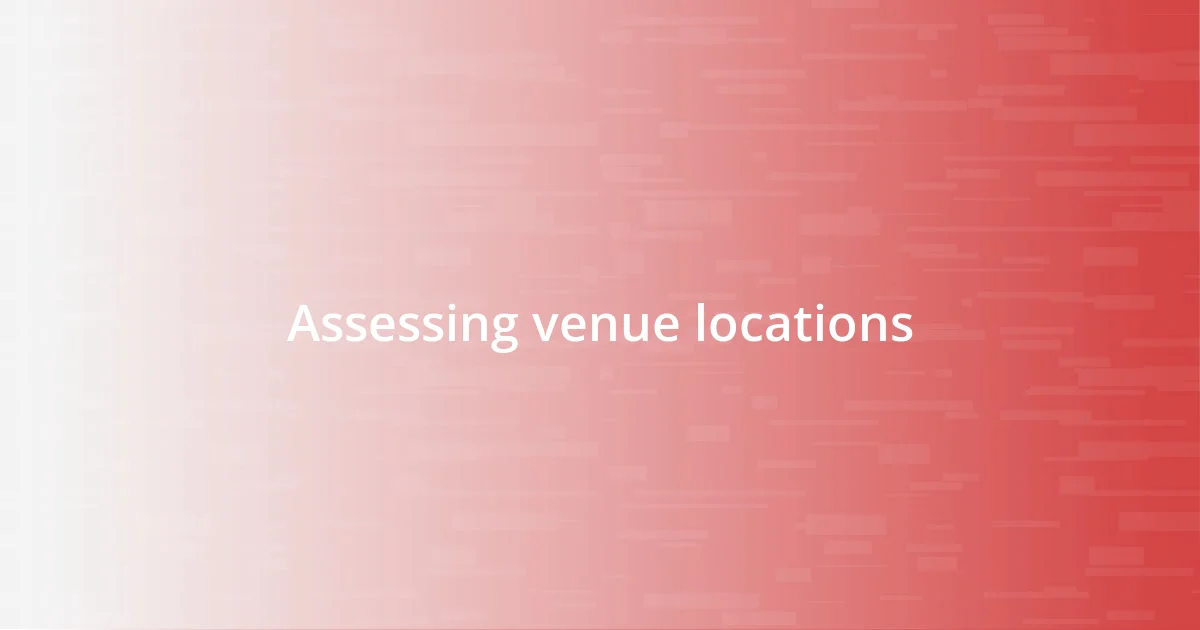
Assessing venue locations
Assessing venue locations goes beyond just picking a spot on the map. I’ve learned this the hard way. During one event, I chose a charming outdoor space, but it was located miles away from public transport, leaving many guests stranded. Reflecting on the location can save you from unnecessary stress—consider public transport links, parking availability, and the general accessibility of the area.
The surrounding environment can also set the tone for your event. For instance, I once hosted a workshop in a busy industrial district, and the noise from nearby construction was distracting. It’s vital to assess not just what’s within the venue, but also what’s happening outside. Trust me, you want your guests to be able to enjoy the experience without external interruptions.
Lastly, think about the venue’s proximity to local accommodations. I vividly recall planning a wedding where many guests flew in from out of town. The venue was beautiful, but the nearest hotels were booked solid. Evaluating the convenience for those who may need to stay overnight can enhance your guests’ overall experience and relieve you of last-minute logistical headaches.
| Location Factor | Importance |
|---|---|
| Accessibility | High |
| Surrounding Environment | Medium |
| Proximity to Accommodations | High |
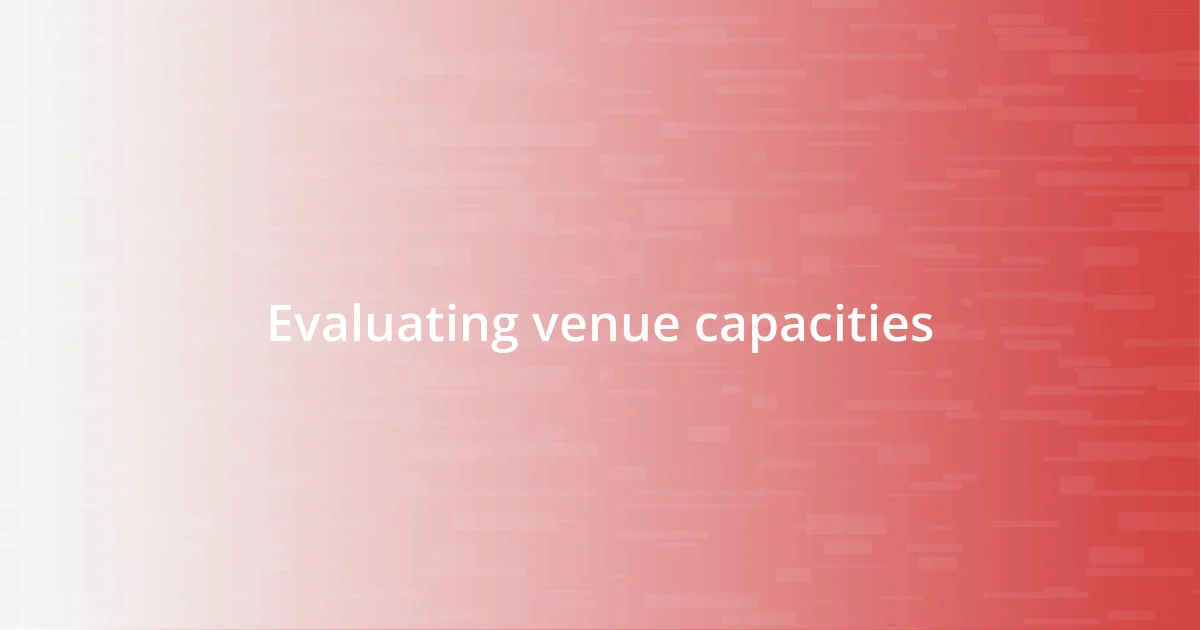
Evaluating venue capacities
Evaluating venue capacities
When I think about venue capacities, I reflect on that moment during a conference I organized. We had a great lineup of speakers, yet the spacious room ended up feeling empty because I miscalculated the numbers. It’s crucial to align the venue’s capacity with your expected attendance. A venue too large can create a sense of disengagement, while one too small can lead to discomfort and a chaotic atmosphere.
To effectively evaluate venue capacities, consider these key factors:
- Seating Arrangement: Different layouts, such as theater or round tables, affect how many people can be accommodated.
- Comfort Space: Don’t forget to factor in aisle space and room for equipment or staging.
- Safety Regulations: Ensure the venue meets fire code capacities and emergency exits.
- Breakout Areas: Think about the need for smaller spaces if your event requires breakout sessions or networking opportunities.
- Flexibility: Consider if the venue can adjust its capacity based on attendance fluctuations.
I recall a wedding reception I attended where the venue boasted a maximum capacity, but it was only comfortable at half that number. Guests were too close for comfort, leading to a crowded dance floor where no one could move freely. As you assess capacity, envision how your guests will interact within the space. They should feel at ease and fully able to immerse themselves in the event.
A well-chosen capacity allows for a blend of intimacy and vibrancy, amplifying the overall experience. Try to visualize the scene you want to create; will your guests feel connected in a smaller space, or energized in a larger crowd? It’s all about striking the right balance.
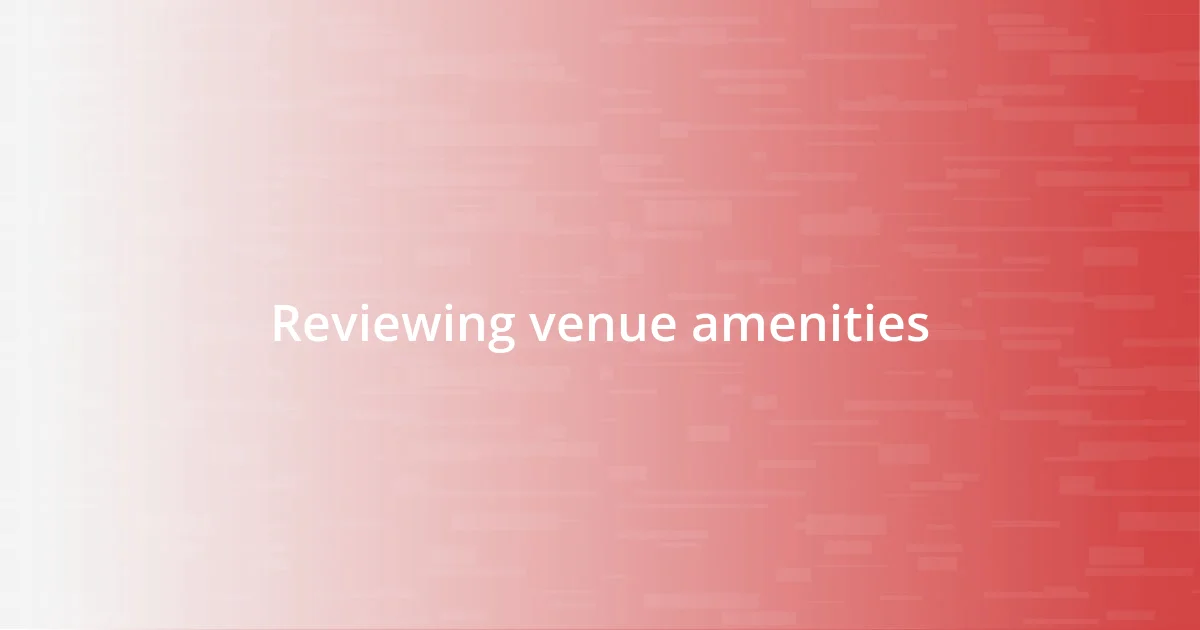
Reviewing venue amenities
When I delve into reviewing venue amenities, I always start by considering the essentials that make an event successful. For instance, I once planned a corporate retreat and overlooked the lack of Wi-Fi, thinking everyone would enjoy the break from technology. Boy, was I wrong! Connectivity can be a make-or-break factor, especially in professional settings where instant communication is key.
Another aspect that often gets overshadowed is the availability of audiovisual equipment. During an arts showcase I attended, the venue promised excellent sound but offered subpar technology that compromised the entire experience. I learned then that checking what’s included—like projectors, screens, or sound systems—can significantly impact the event’s quality. How many times have you sat in a room straining to hear the speaker? Avoiding these pitfalls ensures a seamless experience for everyone involved.
I also think about catering options—will the venue allow outside food, or do they have an in-house service? I recall planning an anniversary celebration where we had to make last-minute changes because the venue’s catering policy was inflexible. Not every guest enjoys the same cuisine, and diversity in food choices can transform an event from mediocre to memorable. I always encourage asking about dietary accommodations upfront to ensure every guest feels included and satisfied.

Analyzing budget considerations
When it comes to analyzing budget considerations for a venue, I always remind myself to look at the bigger picture. It’s not just about the rental fee; there are numerous hidden costs that can sneak up on you. For instance, during a gala I organized, I was blindsided by additional fees for security and cleanup. Rather than finding a great deal, I ended up stretching my budget thin. Understanding these details upfront helps prevent financial surprises that could derail your plans.
I’ve found it beneficial to create a detailed budget breakdown, listing all anticipated expenses, including catering, AV equipment, and even parking. Once, I jotted down everything for a trade show I planned and realized I could save a considerable amount by opting for a venue that included some of these services in their package. Have you ever thought about how much a little extra effort in budgeting could save your event? A comprehensive view helps ensure you’re not just comfortable during the planning but also enjoy the event itself without the burden of financial stress.
Additionally, weigh the benefits of investing in a venue that offers a higher value, even at a slightly increased cost. I remember attending a conference at a venue that seemed pricier at first glance. However, the inclusive services they provided, like free Wi-Fi and ample parking, made the experience smoother and more enjoyable. It reminded me that sometimes, paying a bit more can offer long-term benefits. How do you measure value when budgeting? It’s about weighing convenience and experience against mere cost.
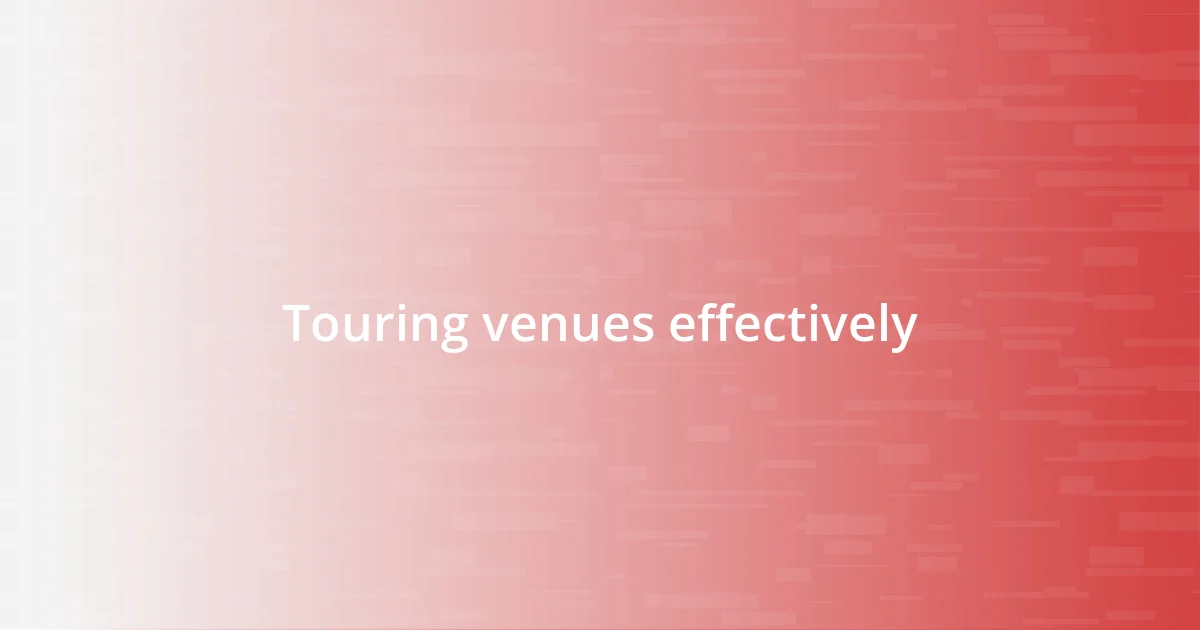
Touring venues effectively
When touring venues, I focus on the overall vibe and energy each space conveys. I once visited a potential location for a wedding and immediately felt the difference as soon as I walked in. The light, airy atmosphere made it seem inviting, while another venue had a darker, claustrophobic feel that left me questioning if it was the right fit. Have you noticed how a venue’s ambiance can shape your expectations? It certainly can set the tone for an entire event.
In my experience, physical layout is crucial. I remember a seminar I organized where the room had an awkward setup, making it challenging for attendees to engage with the speaker. The right arrangement can foster interaction and keep energy levels high. Have you ever been in a space that seemed to work against the event? It’s essential to visualize how the layout will affect both the flow and the experience.
During my venue tours, I also make it a point to connect with the staff. Their enthusiasm and willingness to help can speak volumes about the venue’s commitment to your event’s success. On one occasion, I met a coordinator who went out of her way to share ideas about seating arrangements and décor that I hadn’t initially considered. Engaging with the team can offer valuable insights that elevate your planning. Wouldn’t you agree that a supportive venue staff can make all the difference?

Making the final choice
Once I’ve narrowed down my options, I dive deeper into the specifics that influence my final decision. For example, I once hesitated between two venues for a corporate retreat—one was modern but lacked natural light, while the other had a stunning view but was smaller than ideal. The moment I pictured my team brainstorming in a sunlit room with a beautiful backdrop, the choice became clear. Have you ever found that a simple image can shift your entire perspective?
Another aspect I consider is accessibility. During a charity event I organized, I realized how crucial it was for guests to reach the venue easily. I recall the sheer joy (and relief!) on people’s faces when they found ample parking and clear directions. So, ask yourself: how might accessibility issues impact attendance? The last thing you want is for logistical challenges to overshadow your event’s purpose.
Lastly, I trust my instincts. When selecting a venue for a milestone birthday, I had a gut feeling about one location, despite its higher price. The warmth of the space and friendly staff resonated with me. I often wonder, how much weight do we give to our intuition in decision-making? In this case, my choice became one of my fondest memories. Ultimately, choosing a venue isn’t just about the facts; it’s about recognizing what feels right for the occasion.

